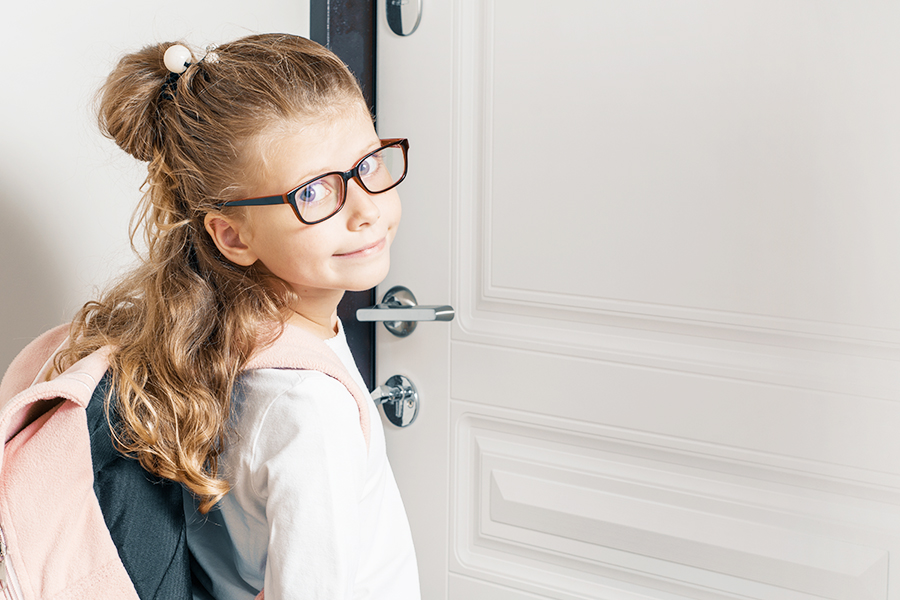Table of Contents

As parents, we want our kids to be independent and self-sufficient, but we also want to make sure they’re safe. While we may be a little nostalgic for our own free-ranging childhoods, we know that times have changed and expectations are different in the 21st Century. Still, most children are perfectly fine to be alone at home for short periods by the time they reach middle school. Parents know their children best and are best equipped to make the call, but your pediatrician can help with guidelines to help you make good decisions about giving your child more independence.
When Is My Child Ready to be Home Alone?
You may be surprised to learn that most states don’t have laws or regulations about leaving kids alone at home. Virginia doesn’t have laws on the books but does offer age 11 as a guideline, in line with recommendations from the American Academy of Pediatrics and other organizations. Of course, so much of the decision depends on your child’s maturity level, along with other factors like whether your child will be home alone occasionally or on a regular basis and whether your child will be at home at night or during the day.
The U.S. Department of Health and Human Services Children’s Bureau offers some questions to help you decide if your child is ready to be home alone:
- Is your child physically and mentally able to care for him or herself?
- Does your child obey rules and make good decisions?
- How does your child respond to unfamiliar or stressful situations?
- Does your child feel comfortable or fearful about being home alone?
- Is there a trusted adult nearby that your child can contact if they feel uncomfortable or scared?
Your pediatrician is also a great resource if you need guidance in making the call.
How Can I Keep My Child Safe When They’re Home Alone?
Once you decide to allow your child to be home alone, you’ll need to start having conversations about staying safe. This should cover everything from using the stove safely to what to do if there’s an accident or someone comes to the door.
The Children’s Bureau offers some great tips for getting ready to leave your child home alone.
- Do a trial outing close to home the first time you leave your child.
- Roleplay possible situations so that your child feels comfortable.
- Set clear rules for what should and shouldn’t happen while your child is home alone.
- Discuss emergencies and how to handle them.
- Check in frequently while you’re out.
- Make sure your child knows a few phone numbers by heart, including yours.
What Are Some Other Milestones for My Child’s Independence?
Leaving kids home alone is a big consideration for many families, but parents often have questions about other milestones, like letting children walk home from school or a friend’s house. There’s not much official guidance on the books in Virginia, but there are some general rules of thumb that may be helpful. Again, keep in mind that so much depends on the individual child.
- Leaving your children in the car: Parents often ask about leaving kids in the car for a few minutes while they run an errand. 20 states have laws on the books about leaving kids unattended in cars, but Virginia isn’t one of them. Several states have made it illegal to leave children under 6 or 7 in cars alone. The AAP also strongly advises against leaving young children alone in the car. (The issue is more related to safety concerns like overheating or accidents than concerns about abduction.) For older children, use your judgment based on your child’s maturity level and length of time away.
- Using public restrooms: Guidelines vary on this issue. Some experts recommend using a family or single-use bathroom when possible. For multi-stall restrooms, many children are ready to go in without a parent by the time they reach elementary school, but this is another case where parents know best. It helps to keep in mind that most sex crimes against children are committed by relatives or acquaintances and not by strangers in public places.
- Walking to school, friends’ houses or the playground: This is another area where opinions (even from experts) vary widely. But thanks to the so-called “free-range kids” movement, things seem to be tilting back in the direction of independence. Federal law now gives parents the right to decide at what age their children are old enough to walk to school (unless there are requirements at the state or local level). Some children are ready by early elementary school, but parents are best equipped to make a decision based on what you know about your child. Walking with siblings or friends when possible is always a good choice.
Helping Kids Become Safely Independent
With good preparation and education, it’s possible to give your children the independence they want and need and still keep them safe. Taking small steps when possible is a great approach, and keeping a healthy dialog going with your child is key. If you need help getting the conversation started or making calls about independence milestones, your pediatrician is a great resource. At Loudoun Pediatric Associates, we care about every child’s physical and mental health and safety and are here to provide families with the support they need to make sound decisions.







